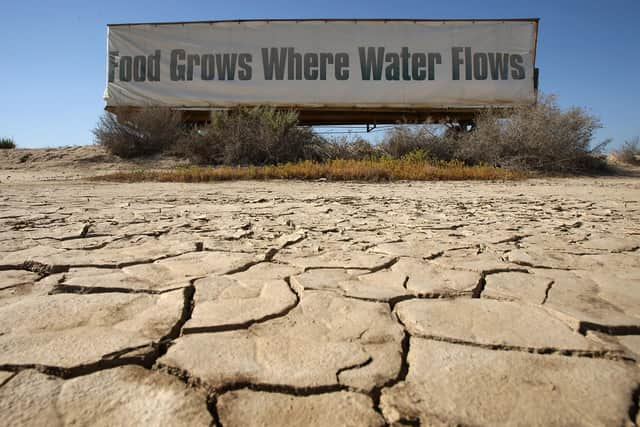Earth Overshoot Day: The reason why it falls one day earlier this year should alarm you – Iain Gulland
It means everything we take and use from our natural environment for the rest of 2022 is depleting our quota of resources for future years – and bringing forward the time when those materials run out altogether.
It’s a scary situation, made even more alarming by the fact that this year’s Earth Overshoot Day falls a day earlier than in 2021. On paper, at least, we’re failing in our efforts to #MoveTheDate in the right direction.
Advertisement
Hide AdAdvertisement
Hide AdThe recent extremes in weather offer a sobering reminder that the effects of the climate crisis are being felt right now, and uncomfortably close to home. With parts of the UK, including Scotland, experiencing record-breaking temperatures it’s clear that climate change won’t wait, and urgent action is needed to mitigate its worst effects.
What can we do?
We’re all familiar with actions like taking reusable bags to the supermarket, while some of us are making bigger changes to our lifestyles when it comes to what we eat and how we travel to cut our carbon footprint.
But if we’re serious about reducing our contribution to climate change, the most impactful thing we can all do is to rethink how we consume.


In Scotland, four-fifths of our carbon footprint comes from all the goods, materials, and services we produce, use and often throw out after minimal use.
That approach is a missed opportunity to realise the value of products and materials we have in use already, instead relying on finite natural resources to make new products. Many of those resources we know are already in short supply.
The demand for new products and materials is problematic in other ways too. Many manufactured goods have a convoluted supply chain that involves them being made elsewhere in the world.
It means Scotland’s consumption habit is responsible for emissions that are damaging the environment, and sometimes human health, in countries poorer and more polluting than ours. That’s a reality that’s hard to measure, and even harder to stomach.
The size of the problem
In the past year, Zero Waste Scotland published Scotland’s first Material Flow Accounts, which found that the average Scot consumes around twice the amount of stuff in a year than our environment can sustain.
Advertisement
Hide AdAdvertisement
Hide AdThat’s twice the amount that’s deemed sustainable for the future health of the planet while still maintaining a high quality of life.
Evolving a circular economy in which resources are kept in high-value use for as long as possible is the best tool we have to help us change up how we consume, ultimately benefiting both people and planet.
What is a circular economy?
The circular economy is about making things last. It can be achieved through smarter design, repair, reuse and remanufacture of products so that goods stand the test of time and are kept circulating within the economy.
For consumers, simply asking ourselves if we really need something before we buy is a vital step to cutting how much we consume. When we do need something, the circular economy means exploring alternatives to ‘new’ and ‘mine’ – making refurbished and second-hand items our first choice, for example, and opting for leasing or sharing models over outright ownership.
In Scotland, these business models are available for everything from clothing to tools to children’s toys, and even for services like lighting.
Choosing to give our custom to businesses that are doing things differently is not just better for the planet; it’s also a powerful market signal that we want more sustainable options and can help drive further circular economy innovation.
For businesses, the circular economy is an opportunity to futureproof their operations, grow in a way that’s more resilient to future shocks and, importantly, stay ahead of consumer demand for environmentally conscious choices. What’s more, evolving a circular economy has the potential to create skilled jobs in remanufacturing, repairing, and new services.
What is happening now?
Scotland is making good headway on evolving a circular economy already. We’re one of the first nations to have a minister with the specific portfolio of green skills, circular economy and biodiversity, and have game-changing initiatives like Scotland’s deposit-return scheme already in train and expected to drive up recycling and reduce litter.
Advertisement
Hide AdAdvertisement
Hide AdWhat’s more, at Zero Waste Scotland, a core part of our work is helping businesses join the circular economy through dedicated funding and support administered on behalf of the Scottish Government. It’s something we’re incredibly proud of, and we have helped more than 250 businesses embed circular practices thus far.
The Scottish Government has recently ramped up efforts to drive a circular economy by launching two public consultations on proposals for a Circular Economy Bill and Route Map to 2025.
It’s a really welcome step with potential to make the circular choice the best option for Scottish citizens, communities and businesses, and ultimately reduce our society’s contribution to climate change.
It’s also an opportunity for everyone in Scotland to help shape the nation’s future circular economy approach. Responding to the consultations is a simple way for us to play our part – and Earth Overshoot Day is an important reminder of how vital it is that we all do.
The public consultations on proposals for a Circular Economy Bill and Route Map to 2025 are open until August 22. To find out more visit livingcircular.scot. For more information on the circular economy go to Zero Waste Scotland’s website.
Iain Gulland is chief executive of Zero Waste Scotland
Comments
Want to join the conversation? Please or to comment on this article.
